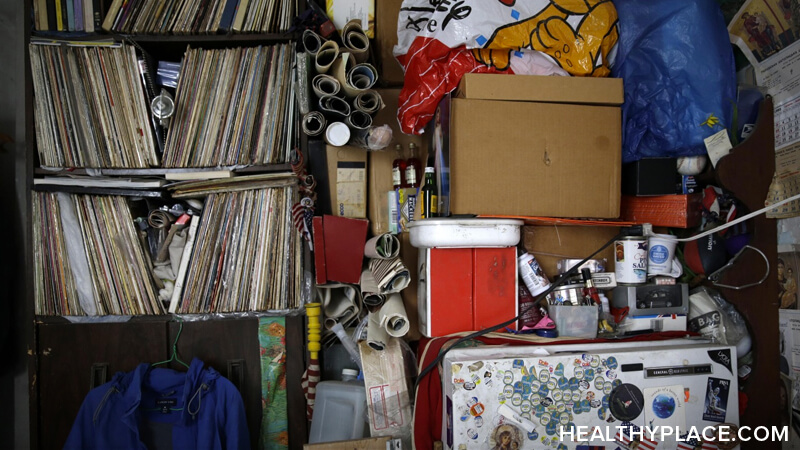The Connection Between ADHD and Hoarding

A large number of hoarders have attention-deficit/hyperactivity disorder (ADHD) or ADHD-like symptoms. Hoarding becomes a disorder when sorting through and getting rid of possessions causes extreme anxiety.1 Previously considered a subset of obsessive-compulsive disorder (OCD), hoarding is now its own disorder. Many hoarders still have OCD, and studies find that ADHDers are also very susceptible to the condition.
Why Do People Hoard?
Though I do not have hoarding disorder, I struggle with discarding old items, particularly papers. Throwing things away can evoke a sense of loss and worry that I am making an irreversible mistake. At least one other person in my family who has ADHD also struggles with disposing of clutter, particularly when the objects have an emotional, almost totemic, significance to him. At the same time, I know others who do not have ADHD who have a hard time letting go of possessions. Trauma, poverty, and various mental illnesses can contribute to hoarding.
Hoarding and ADHD
Surprisingly, researchers are finding evidence that there may be a stronger connection between hoarding and ADHD than OCD.2 Compulsive buying, inattention to one’s surroundings, and difficulty organizing and prioritizing items are key components of hoarding. Impulsiveness, attention, and prioritizing are significant parts of ADHD as a result of our challenges with executive functions (our brain’s “manager”).
Here are a few ways in which ADHD can lead to hoarding:
- Distractability: The more objects there are, the more opportunities exist for being distracted from the task of organizing and removing possessions. Distractions can also result in clutter-blindness. If our attention is elsewhere, we will not notice aspects of our environment.
- Impulsivity and emotions: If an ADHDer struggles with compulsive shopping or collecting, it is very difficult to fight against that urge. Because of our strong emotions, we might form strong attachments to our belongings.
- Working memory issues: I worry about “forgetting” information a random piece of paper might contain. ADHDers struggle with memory, particularly organizing and keeping several ideas in one’s mind at the same time. It is difficult to retain momentum for a project that has so many steps, and clearing out clutter involves numerous tasks. One has to sort, prioritize, tidy, and schedule.
- Prioritizing and possibilities: The ADHD brain sees many possibilities for every item and scenario (unless we revert to black-and-white thinking), which makes us creative. This also makes it hard to prioritize. Instead, we wonder (speaking for myself, at least) if we can just “have it all."3
A Few Ways to Deal with or Prevent Hoarding If You Have ADHD
Perhaps the main way I deal with clutter is to shop very little. I am very reluctant to buy something I cannot use. One tip for tackling clutter is to take one tiny step at a time. Regularly getting rid of one thing every few days is better than feeling too overwhelmed to get rid of anything. If possible, bring someone else in to go through your piles of stuff. Even people with hoarding disorders have far fewer problems cleaning out strangers’ belongings, so emotional detachment is very helpful. There is still hope for those with more severe hoarding disorders via therapy, skill-building, and support groups.
Do you struggle with mild or serious hoarding? Please leave any tips in the comments, and thank you for reading.
Sources:
- Neziroglu, F., Hoarding: The Basics. Anxiety and Depression Association of America, accessed May 2019.
- Hacker, L.E. et al, "Hoarding in Children With ADHD." Journal of Attention Disorders, Aug. 2012.
- Kolberg, J., "Stop the Slide from Clutter Into Hoarding." ADDitude, Oct. 2018.
APA Reference
Matteson, N.
(2019, May 15). The Connection Between ADHD and Hoarding , HealthyPlace. Retrieved
on 2026, January 21 from https://www.healthyplace.com/blogs/livingwithadultadhd/2019/5/the-connection-between-adhd-and-hoarding
Author: Noelle Matteson
Thanks! You say "I am very reluctant to buy something I cannot use." May i offer an improvement to that statement? My wife has adhd and hoards. She always tells me how she can use the item. I try to tell her "everything ever made on the earth, had a purpose for being made. So any item can be put to use. The question then, should not be 'Can i use this?' but rather 'Do i NEED this?' "
The only items that should ever be acquired, are those for which a need was identified BEFORE seeing the item.
Thank-you for the helpful information. I don't have ADHD; I have clinical depression. But my sister/roommate DOES have it, and she's a definite hoarder. You, along with other resources, have given me a better understanding about what she's going through and how to navigate through it.
Informative, thank you. I have a problem with Digital Hoarding, but I've been deleting lots of stuff lately. I try not to look to much at what I delete, or I'll end up thinking 'mhm maybe this would actually be of some use in the future' and save it form the bin hah.